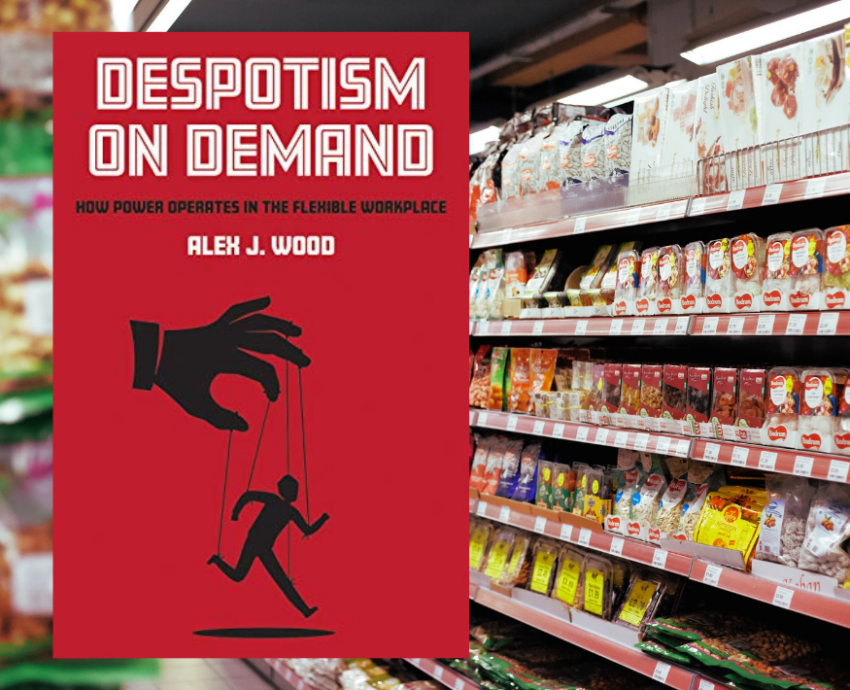
Despotism on Demand: How power operates in the flexible workplace
By Alex J Wood
Cornell University Press, 2020.
178 pp., $20.99
Whether it be via zero-hours gig-economy contracts or casual short-term contracts that keep getting renewed, permanent, full time jobs are increasingly a thing of the past. Bosses claim the modern, flexible workplace is a wonderland of freedom and self-expression.
But what is it like for workers?
United States sociologist Alex Wood went undercover to see for himself. He worked for a British retailer for eight months and in the US he worked for a union organising drive targeting a major employer in California.
The two companies he calls “PartnershipCo” and “ConflictCo”, which describes their contrasting styles of relating to workers. They are transparently Tesco and Walmart.
Both used management control of flexible rosters to keep workers disempowered and hanging on the end of a string. But with differing labour movement traditions in each country, management behaved in unlike ways.
Because there is a stronger heritage of unionism in Britain and stronger state intervention into working conditions, “PartnershipCo” has adopted a cosy relationship with its workers’ union. The union can organise freely on site and there are worker/management collaborative committees to discuss issues.
There is a highly detailed procedure covering how managers can discipline workers, which is circulated freely.
Management, however, has complete control over workers’ rosters and they play on that insecurity. In fact, managers dangle extra shifts in front of workers as though they are gifts, ensuring that individuals compete to win favour.
Wood says the union restricts itself to supporting workers in disciplinary hearings, not organising the workers as a whole. The union successfully defends individuals and ensures job security, but on the whole workers feel vulnerable.
“PartnershipCo” is one of the most profitable businesses in the world, yet it pays the minimum wage. It has “hegemonised” the workplace, effectively incorporating the union into its structures, said Wood.
At “ConflictCo” the management simply bans unionism and is prepared to shut down stores that successfully unionise. The owners, who are the descendants of the original owner, seek to win ideological support from the workers by pushing a personality cult of the company's founder.
Special magazines with photos and stories of the founder are given to the workers and they are required to participate in a special company cheer every day.
In return for their loyalty, the workers are treated like dirt. Paid near-starvation wages, they have to compete to gain extra shifts.
Wood records that one worker he spoke to had a wife and two children. The worker knew that the poverty line for a US family of four is US$20,000 per year and that he was earning $4000 below that. He could not even afford a bed for his kids.
“ConflictCo” has a completely obscure disciplinary procedure that is kept secret from workers. Managers can freely punish workers in a myriad of ways.
These workers are trapped. If they quit their jobs, the state denies them unemployment benefits.
At both “PartnershipCo” and “ConflictCo” workers’ shifts were cut back if they complained, but were not in a position to prove they were being unfairly targeted. This is the meaning of the expression “flexible despotism” that Wood coins.
However, a major difference was the degree of employee surveillance.
“ConflictCo” has cameras everywhere, making sure that everyone feels observed at all times. “PartnershipCo” depends more on its incorporation/domination of the union.
What does the future of work look like? Wood is pessimistic.
There are developing mechanisms for enforcing workplace discipline, which Wood calls "algorithmic management". Using customer feedback data, a manager does not even have to be physically present to oversee an employee
The use of customer rating systems, similar to Uber's, mean that management can single out individuals for rough treatment without ever having to reveal what is going on.
However, workers are fighting back.
“ConflictCo” workers joined together and used flashmob-type actions and social media to publicly expose the company. They won immediate improvements.
No matter how much workers are hegemonised, incorporated, manipulated, oppressed or terrorised, the fact remains that bosses need workers and workers don’t need bosses. Workers invariably find their way to organisation and solidarity.